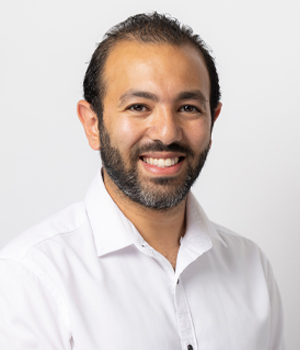Anna Ahn

Resume
Anna has extensive experience in teaching Korean language to students with different levels and needs. She believes that language learning should be fun and enjoyable which always draws the best outcome. Her teaching is focused on practical language skills that students need to communicate in a real world.
Anna has a Masters degree in Teaching Korean as a Foreign Language from the University of Sydney, a Cert IV in TAE and a Diploma of Interpreting (Korean and English in both directions). She taught Korean at the Korean Education Centre in Sydney and currently teaches at the University of Sydney.
Pilar Alejandro

Resume
Pilar is the Convener of the Spanish language program at the University of Sydney’s Centre for Continuing Education (CCE). She is an experienced teacher having been teaching for almost 30 years in different countries and different environments. During this time, she has taught Spanish and French at different universities and language schools in Peru. Since she came to Australia Pilar has been teaching Spanish and French at the University of Sydney, Macquarie University, and the University of Technology Sydney.
During her time as a teacher at Macquarie University, Pilar has received a teaching award in recognition of her outstanding contribution to teaching and student learning.
Pilar holds a Master’s degree (M.A.) in Spanish as a Foreign Language (Nebrija University, Spain), a Master of Philosophy from the University of Sydney, and a Bachelor of Education from the University of the Sacred Heart, Peru and she is currently completing a PhD at Macquarie University.
Leila Alem

Resume
Adjunct Professor Leila Alem brings 25+ years of experience in partnering with industry to solve complex problems and deliver impact in a range of industries. Her expertise includes designing award-winning digital products and new customer experiences leveraging emerging technologies such as AI, Wearables, AR/ VR and MR and using Design Thinking, Lean Start-up and Agile methodologies. She has over 10 years of experience in entrepreneurship, building new innovation programs and practices to drive client engagement. Her corporate entrepreneurship experience includes the government and consulting sectors.
Leila has an extensive experience in teaching at undergraduate, Master and corporate levels both in Australia and overseas. Her subjects include innovation, entrepreneurship, lean startup, design thinking, system thinking, technology disruptors etc. She has taught in the award-winning UTS Bachelor of Creative Intelligence and Innovation, in the University of Sydney Master of Design and UTS executive MBA. She won the 2013 NSW State Innovation Award in R&D and was a finalist for The Women Infotech Outstanding Career Achievements Award in 2015.
Leila holds a PhD is in Artificial Intelligence and is a member of the National AI Think Thank. Her research draws on real industry challenges to explore novel ways of working, learning and collaborating using AI, VR, AR and IOT. She has 150+ peer-reviewed publications and is the editor of books and international journals in the next frontiers of Human-Computer Interaction.
Leila is currently an Adjunct Professor in Human-Computer Interaction at UTS. She was Principal Consultant at Thoughtworks, a global innovation consulting firm, for 2 years and Principal Research Scientist at CSIRO for 23 years.
Marshal Alkouz

Resume
Hammam (Marshal) Alkouz is a certified Project Management Professional (PMP®) and dynamic Project, Program, and PMO expert with a successful track record in managing multi-million dollar projects across industries like EPC, Oil & Gas, IT/ERP, Business Transformation, Education, and Government.
With over 5000 hours of Project Management training, Marshal specializes in PMO set-up, Project/Program Management, and Lean Six Sigma tools for continuous improvement. His educational background includes an MBA from the University of Atlanta.
As an Adjunct Lecturer at the University of Sydney and UNSW, Marshal teaches courses on Computer Applications in Project Management. He actively contributes as a Trainer & Mentor for PMI-Sydney and a Training Content Author for Certifeka International.
In his professional career, Marshal serves as a Director and Board member at PMI Sydney, an Agile Project/PMO Consultant & Trainer, and has held roles in Program/Project Management and Process Improvement for government and private sector organisations.
Classes
- Project Management Course: The Master Class
- Agile Scrum Master Certified (SMC™) Course
- Change Management for Projects Course: Core Skills
- Change Management for Projects Course: Advanced Skills
- Project Management Course: Introduction
- Project Management Course: Core Skills
- Lean Six Sigma Course: Improve Productivity
- Risk Management Course & Corporate Governance
- Strategic Sourcing and Procurement Course: Processes and Skills
Tony Arnold

Resume
Tony spent the first 12 years of his professional career developing software algorithms for companies including Canon, the CSIRO and Fairlight before transitioning into the transport sector where he has worked on a variety of issues such as freight optimisation and network design. Tony’s key areas of expertise are geospatial analysis, software development (C++, Python, Django, R, Javascript), discrete choice modelling and mixed-methods research. He teaches several subjects at the University of Sydney and the Centre for Continuing Education including Python, R and GIS analysis.
Tony leads the Data & Analytics work on walking and cycling at Transport for NSW, and recently completed a PhD exploring the impacts of automated vehicles on walking and cycling in contrasting environmental contexts. He uses a diverse set of technical skills to tackle challenging problems, and is passionate about encouraging walking and cycling as a means to improve the life of people and the cities they inhabit.
Farid Awad

Resume
Farid Awad has been teaching mathematics since 2005. He has vast experience in secondary education and private tutoring, and extensive knowledge of all Stage 6 Mathematics courses for the Higher School Certificate. Farid is currently the Mathematics Curriculum Head of Department at a Sydney High School which aims to strengthen students’ mathematical understanding for their future endeavours.
Farid holds a Bachelor of Science degree with a double major in Mathematics, and a Bachelor of Secondary Education degree with a first-class Honours Thesis from the University of Sydney.
Farid has experience as both a facilitator of student workshops and presenter of professional learning for staff. He has led HSC study days, presented to teachers on innovative mathematics practices, and made sustainable changes to the teaching and learning of mathematics to facilitate student engagement.
At the core of Farid’s teaching is a joy and commitment to student impact and the desire to build passion around the language, logic, and appreciation of mathematics.
Cheryl Ballantyne

Resume
Cheryl is a versatile freelance writer, editor, and educator, with a specific focus on guiding individuals to communicate clearly, concisely, and accurately. In 2014 and 2015, she played a pivotal role in the NSW Department of Education, holding a senior position where she led the coordination of policy and procedure review and development.
Cheryl's academic journey is marked by a Bachelor of Arts with a Diploma of Education, majoring in linguistics and education. Her commitment to language and education further culminated in a Master of Arts in Teaching English to Speakers of Other Languages (TESOL) and a Graduate Certificate in Management. Elevating her expertise, Cheryl holds a PhD in education, reflecting her dedication to advancing knowledge in the field. Cheryl's unique blend of skills positions her as a valuable resource in the realms of writing, editing, and education.
Juan Carlos Barreno Galloso

Resume
Juan Carlos is an experienced language teacher, having taught Spanish for over 25 years. He has been a facilitator at the Centre for Continuing Education since 2012. Juan Carlos holds a Master of Applied Linguistics and is currently completing a PhD at the University of New England.
Juan Carlos' experience includes teaching Spanish in Germany, where he completed a Master of Science with a full scholarship from the Konrad Adenauer Foundation. He has also taught French in Peru where, as a staff member of the Bureau de Coopération Linguistique, he organised French courses for Specific Purposes (medicine and hospital management). In Australia Juan Carlos has been a language tutor at various Universities. On two occasions, he participated in the international final of La Dictée des Amériques (a French orthography competition in Canada).
Juan Carlos is passionate about languages. In addition to Spanish, French and English, he also speaks German, Italian, and Portuguese, and has studied Russian, Modern Greek, and Japanese. He combines his knowledge of linguistics and world culture with a good sense of humour, delivering motivating and animated classes.
Peta Bayman

Resume
Peta is a passionate learning and development professional who specialises in team dynamics; particularly in helping organisations build conscious cultures that flow from an aligned and high-performing leadership team.
Peta started her career in sales and moved into management, before discovering learning and development. Today, she works as a training facilitator and corporate coach. She specialises in the areas of individual development and team performance and has worked for a range of government and corporate clients, designing and delivering hundreds of workshops. Clients have included banking and finance, energy and professional services as well as a number of universities.
The focus of Peta’s work is to help individuals and groups leverage their own and collective skills to create outcomes that matter while navigating the volatile, uncertain, complex and ambiguous world of today. Her key areas of work include leadership development and coaching, team readiness and effectiveness, and conflict and communication skills effectiveness.
Peta has travelled and worked extensively in Australia and overseas, including the USA, Hong Kong, Singapore, Thailand, Malaysia and India. During this time Peta opened and operated a company in Singapore for a number of years.
Peta holds a Master’s in Management and has undertaken training in counselling, coaching and conflict resolution. Participants describe Peta as an inspiring and skilled presenter who likes to add fun and laughter into the mix of learning.
Xavier Beau-Davis

Resume
Xavier Beau-Davis has extensive qualifications and experience in design and graphic arts, including a Bachelor of Design and a Diploma in Graphic Arts. He also successfully runs his own company specialising in creating websites.
Xavier has operational experience in a myriad of industry sectors such as Financial Services, Insurance, Education, Information Technology, Local Government, State Government, Commonwealth Government, Not-For-Profit, Banking, Entertainment and the Media.
Xavier has been a computer trainer and teacher for many years in both corporate and educational environments and holds a Certificate IV in Workplace Training and Assessment. He has experience consulting or delivering training in all the aforementioned industry sectors.
Xavier believes that computers are just a tool to let people create their own designs and he enjoys providing learners with some simple techniques so that everyone can achieve this goal.